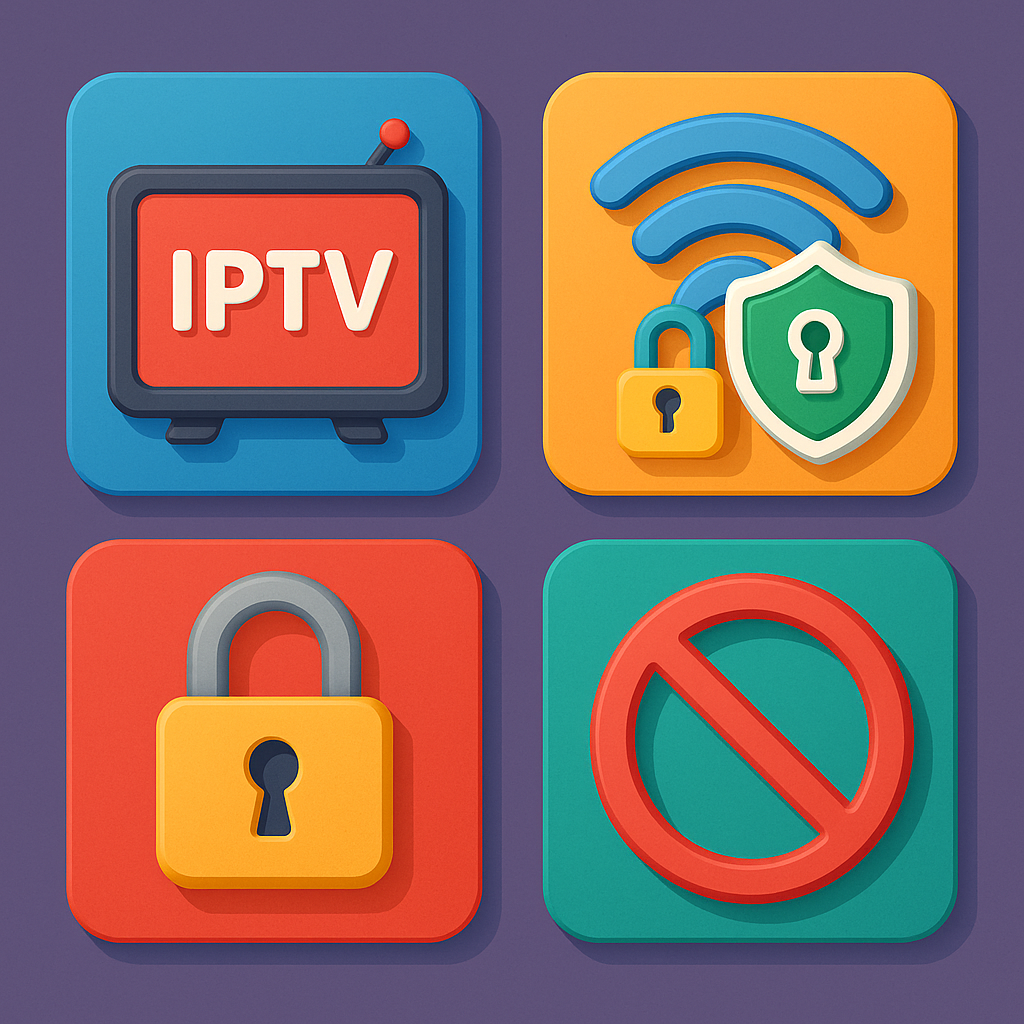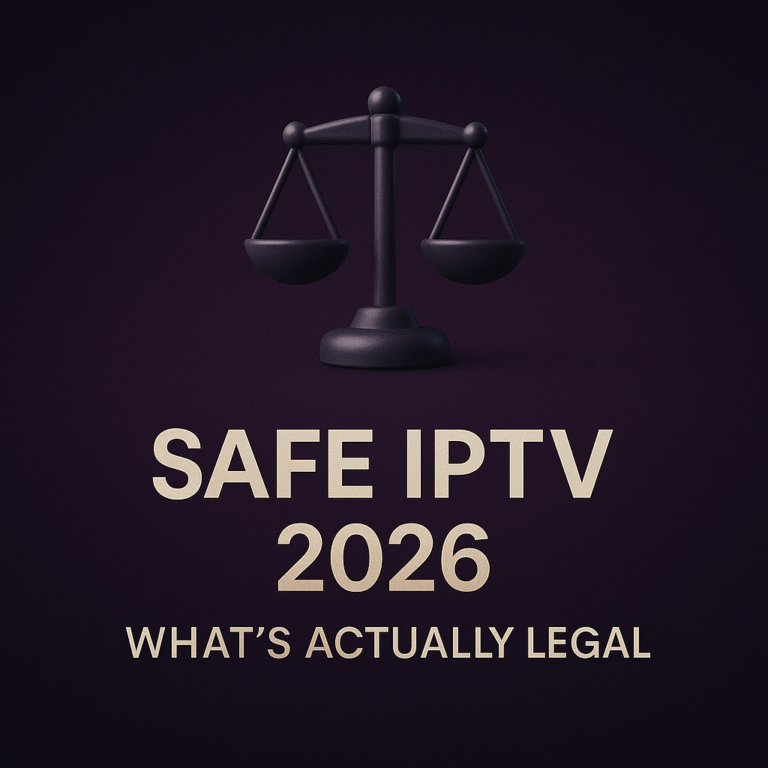How to Secure IPTV Streams on Public WiFi in 2026

🔒 In 2026, streaming IPTV on public WiFi networks is more common than ever — whether you’re in a café, airport lounge, or hotel lobby. But public WiFi introduces risks: eavesdropping, throttling, and data hijacking. In this guide, you’ll learn how to secure your IPTV streams on public WiFi with steps you can apply right away.
⚠️ Why Public WiFi Poses a Threat to IPTV
Public WiFi networks are often unsecured or lightly protected, making them fertile ground for attackers. When you stream IPTV over such a network without precautions, these are some of the dangers you might face:
- 👂 Man-in-the-Middle Attacks (MITM): An attacker intercepts your data traffic between your device and the IPTV server.
- 📉 Traffic Throttling: The network operator or ISP might slow down IPTV traffic, especially when many users stream.
- 🎯 DNS Hijacking: Attackers or compromised routers can redirect your request to malicious servers.
- 🕵 IP/Identity Exposure: Your IP address and subscription info may be exposed to observers.
To enjoy IPTV securely, you need more than just a good app — you need end-to-end protection of your traffic.
🛡️ Step 1: Always Use a VPN or Tunnel
The most critical thing you can do to secure IPTV on public WiFi is to route your traffic through a trusted VPN or encrypted tunnel. Here’s how to choose and configure it:
What to Look for in a VPN in 2026:
- 🔐 AES-256 Encryption with strong key exchange (e.g. ECDHE).
- ⚡ High Performance and servers optimized for streaming, minimizing added latency.
- 🚀 Split Tunneling: Ability to tunnel IPTV traffic while leaving other apps outside the VPN.
- 🌍 Global Server Network to reduce load and latency for international streams.
- 🧪 No-logs Policy for privacy assurance.
To configure your VPN:
- Install the VPN client on your device (smartphone, tablet, mini-PC).
- Connect to a server close to your IPTV server (to reduce delay).
- Activate “Kill Switch” or “Network Lock” so your traffic doesn’t leak if VPN drops.
- Enable split tunneling and whitelist your IPTV app, so only that traffic goes through the VPN.
💡 Pro Tip: Some IPTV apps now integrate built-in VPN APIs. If yours does, you may skip a separate VPN app if it meets the security standards above.
🔑 Step 2: Encrypt DNS Requests
Even with a VPN, DNS leaks can expose which IPTV channels or servers you’re accessing. That’s why using encrypted DNS is crucial in 2026. Many ultra-portable devices now support DNS-over-HTTPS (DoH) and DNS-over-TLS (DoT) natively.
How to Enable Secure DNS:
- ⚙️ On Android/iOS: Go to network settings → enable Private DNS (set to DoH provider).
- 💻 On ChromeOS/Windows mini-laptops: Choose a secure DNS option like Cloudflare (1.1.1.1) or Google DNS with DoH.
- 🌐 In-app settings: Some IPTV apps now allow specifying DNS inside their advanced settings.
With encrypted DNS, your ISP and attackers can’t easily monitor or tamper with the servers you connect to.
🔒 Step 3: Secure Your Device and Network Settings
Public WiFi makes your device more vulnerable. By hardening your device, you reduce the risk of compromise:
- 📱 Disable Auto-Connect: Don’t let your device auto-join unsecured WiFi networks.
- 📴 Turn Off File Sharing: Disable Bluetooth and AirDrop when streaming IPTV in public.
- 🧩 Use Firewall Apps: Lightweight firewalls can block suspicious traffic from unknown IPs.
- 🔋 Keep Firmware Updated: Ensure your device’s OS and IPTV app are running the latest patches.
💡 Quick Tip: Some VPNs now include built-in firewall and malware protection modules, giving you a two-in-one solution for IPTV security.
🔍 Reality Check
Streaming IPTV on public WiFi in 2026 is far safer than it was years ago, thanks to VPN adoption, encrypted DNS, and stronger device security. However, challenges still exist:
- ⚠️ VPN Overheads: Even the fastest VPNs may add ~5–10% latency, which can impact 4K IPTV streams.
- ⚠️ Battery Drain: Security apps and VPN tunneling consume extra power on ultra-portables.
- ⚠️ Blocked VPN Servers: Some public WiFi hotspots actively block VPN traffic, requiring obfuscation modes.
- ⚠️ Shared Networks: Remember, you still share bandwidth with others — performance may drop during peak hours.
👉 These aren’t deal-breakers, but being prepared for them ensures a frustration-free streaming experience.
❓ Frequently Asked Questions (FAQ)
1. Is it safe to stream IPTV on public WiFi?
It can be safe if you use a VPN, encrypted DNS, and disable auto-connect features.
2. Which VPNs are best for IPTV in 2026?
Choose providers with streaming-optimized servers, no-logs policies, and split tunneling features.
3. Can public WiFi owners see what I stream?
Without a VPN, yes. With a VPN and encrypted DNS, your activity is hidden from network admins.
4. Does a VPN slow down IPTV?
Slightly, but modern VPNs with WireGuard or proprietary protocols keep speed losses minimal.
5. How do I know if my DNS is leaking?
Run a DNS leak test online while connected to a VPN. If results show your ISP, you’re leaking.
6. Can I secure IPTV on hotel WiFi?
Yes. Use a VPN, disable device discovery, and avoid streaming in peak hours for best results.
7. Do IPTV apps have built-in security?
Some modern apps integrate VPN APIs and anti-leak features, but not all — always verify.
8. Is 5G safer than public WiFi?
Yes, 5G cellular networks are generally more secure than open WiFi hotspots.
9. Can hackers steal my IPTV credentials?
If you log in over unprotected public WiFi, yes. VPNs and HTTPS connections prevent this.
10. Should I always use premium IPTV services?
Yes, premium providers ensure higher security, stable servers, and legal compliance.
✅ Final Verdict
Streaming IPTV on public WiFi in 2026 is entirely possible — but only if you take the right precautions. VPNs, encrypted DNS, and secure device settings are no longer optional; they’re essential for protecting your privacy and keeping your streams stable.
For the best results, pair these security steps with a trusted IPTV provider. One of the most reliable options we’ve tested is Premium IPTV by CCCAM2. It offers fast servers, excellent security compatibility, and playlists that work seamlessly with ultra-portable devices.
👉 Whether you’re streaming in a coffee shop or on airport WiFi, securing your IPTV streams and using a premium subscription like this one ensures both safety and quality. Don’t compromise — secure your streams today.






